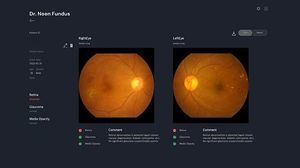

- Products
- Catalogs
- News & Trends
- Exhibitions
Disease risk management software Dr. Noon CVDmedicalcardiovascularartificial intelligence

Add to favorites
Compare this product
Characteristics
- Function
- disease risk management
- Applications
- medical, cardiovascular
- Type
- artificial intelligence
Description
Retina-based AI solution that predicts the future risk of cardiovascular disease riskRegulation InfoDr. Noon CVD_Korea MFDS : [Product Name] DrNoon for CVD / [Product License No.] 제허 22-513호 / [Date of Initial Approval] 1 August 2022 / [Validity Period]1 August 2022 – 31 July 2027 [Issuer ] The Ministry of Food and Drug SafetyDr. Noon CVD_CE : EC Certificate issued under the European Medical Device Regulation (EU MDD) / [EC Certificate No.] KR21/81826550 / [First Issue Date] 11 May 2021 / [Expiry Date] 31 December 2028 / [Issuer] SGS Belgium NVDr. Noon CVD_FDA : Under the DeNovo PathwayAI-powered Solution for Cardiovascular Disease Risk AssessmentDr. Noon CVD is a retina-based AI solution that predicts the future risk of cardiovascular disease.It is the world’s first AI-powered solution utilizing retinal imaging to assess cardiovascular risk.In Korea, it is commercialized with regulatory approval and reimbursement, making it widely accessible in clinical practice. Globally, it is commercialized in Dubai, UK, and Italy with regulatory approvals in 8 regions. Adopted in many hospitals and clinics, it provides accurate, non-invasive, and cost-effective methods.How Dr. Noon CVD Uses AI for Cardiovascular HealthCardiovascular diseases develop silently over time and can lead to fatal conditions such as heart attacks and strokes. Early detection is crucial to prevent severe complications before they occur. Watch the video to learn how Dr. Noon CVD leverages AI and retinal imaging for cardiovascular risk assessment.Patient JourneySTEP 1 - Patient Identification: If a patient is suspected of being at risk for cardiovascular disease—such as those with diabetes, hypertension, hyperlipidemia, or obesity—the Dr. Noon CVD is recommended.STEP 2 - Clinical Consultation: A medical professional conducts a consultation, reviewing the patient’s medical history and current health status.STEP 3 - Eye Scan: Take one picture of each eye to capture the retina.STEP 4 - Image Upload: The retinal images are uploaded to the healthcare institution’s server or cloud platform.STEP 5 - AI Analysis: Artificial intelligence automatically analyzes the images to assess the patient’s risk of cardiovascular disease.STEP 6 - Result Review: The risk of cardiovascular disease is determined through an automatically generated report.Comparison with Traditional MethodsA comparison with traditional methods highlights Dr. Noon CVD's superior performance over conventional tests in assessing cardiovascular risk.TypeEase of UseAccessibilityFootprint & EquipmentRadiation ExposureCostTurnaround TimeOperator DependencyRisk Prediction AccuracyRetina-based coronary calcium score predictionEasy (Simple retinal photo, <3 min)High (Usable in primary care)Small (Requires only fundus camera)NoneLow (Affordable)Fast (Instant AI result, <3 min)Low (Minimal training needed)High (Comparable to CACS)Heart CTDifficult (Needs specialized CT machine)Low (Tertiary care only)Large (Expensive CT scanner required)Yes (Involves radiation)High (Expensive)Slow (Multi-step processing)High (Requires technician, radiologist)High (Current gold standard)Carotid UltrasoundDifficult (Needs trained sonographer)Low (Tertiary care only)Large (Handheld device + trained operator)NoneModerate (Varies)Slow (≥10 min + post-analysis)High (Sonographer or physician required)Moderate (Lower than CACS)Pulse Wave VelocityDifficult (Needs specialized equipment)Low (Tertiary care only)Large (Niche equipment, not widely used)NoneModerate (Varies)Variable (Depends on setup)Medium (Operator influences result)Moderate (Lower than CACS)Key BenefitsHigh Accuracy: Predicts cardiovascular disease risk with accuracy comparable to heart CT.Safe & Non-Invasive: Requires no needle injection or radiation exposure, making it comfortable for patients.Cost-Effective: Compared to conventional cardiovascular screenings, the test is available at a more affordable cost.Fast Test Results: Results are delivered promptly, allowing patients to receive their reports without delay.High Accessibility: Designed for wide use across clinics, hospitals, and health screening centers, enabling broader access to risk assessment.Our CustomersDr. Noon CVD is utilized by leading hospitals, clinics, and check-up centers in Korea and worldwide, offering early cardiovascular risk assessments to patients.Publications & WebinarsCardiovascular disease risk assessment using a deep-learning-based retinal biomarker: a comparison with existing risk scoresPivotal trial of a deep-learning-based retinal biomarker (Reti-CVD) in the prediction of cardiovascular disease: data from CMERC-HIValidation of a deep-learning-based retinal biomarker (Reti-CVD) in the prediction of cardiovascular disease: data from UK BiobankTechnical Specifications / FeaturesAI software medical device for cardiovascular risk predictionUses retinal images for analysisRegulatory approvals: Korea MFDS, CE (EU MDD), FDA (DeNovo Pathway)Non-invasive, no radiationInstant results (<3 min)High accuracy (comparable to CACS/Heart CT)Usable in primary care settingsRequires only a fundus cameraLow operator dependencyCommercialized in Korea, Dubai, UK, Italy, and more
VIDEO
Exhibitions
Meet this supplier at the following exhibition(s):

*Prices are pre-tax. They exclude delivery charges and customs duties and do not include additional charges for installation or activation options. Prices are indicative only and may vary by country, with changes to the cost of raw materials and exchange rates.



